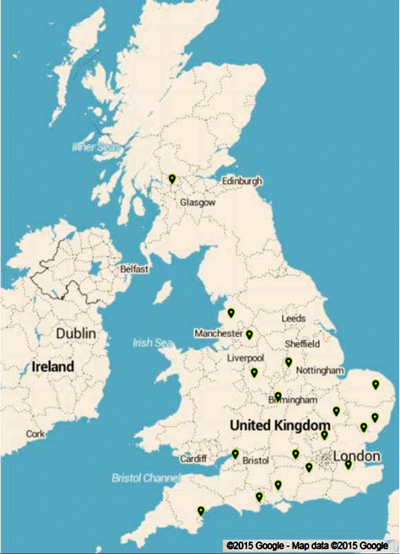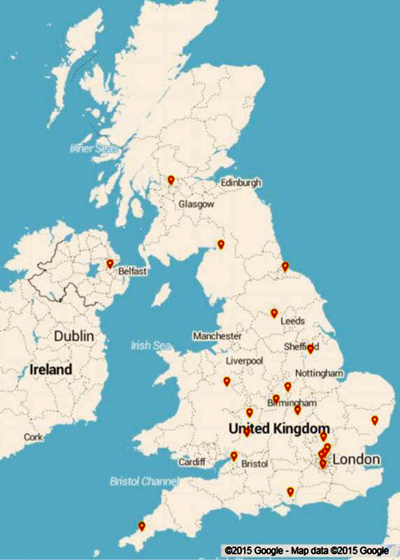The Statement of Intent: Cancer Strategy for England: 2015-2020 indicates that the number of people diagnosed with cancer each year will continue to grow rapidly due to the ageing population. There is also a requirement to diagnose and offer patients high quality cancer treatment in line with the best in the world [1].
More men will receive radiotherapy treatment for prostate cancer than any other treatment modality. This comes as a direct result of an increase in the numbers of men being diagnosed with the disease, continuous advances in radiotherapy treatment and mounting calls to match levels of radiotherapy being delivered internationally.
An analysis of radiotherapy provision in 2013 and published in The Lancet [2] showed that some European countries do not have the quantity or quality of radiotherapy facilities required to provide an adequate service to their populations, while some have more than enough. This analysis showed the UK to be under capacity by 21% compared with optimal levels.
The European Society for Radiotherapy and Oncology (ESTRO) survey [3] highlighted that the proportion of patients in the UK receiving radiotherapy is estimated to be approximately 65% of what is optimum based on current best evidence. Internationally, it has been reported that on average 50% of patients with cancer should receive radiotherapy at some point in their cancer journey. In England this rate is around 40% currently, so there is a gap between mapped and optimum. The growth of radiotherapy in England is between 1-2% per annum.
It was against this background that Prostate Cancer UK commissioned the Society and College of Radiographers (SCoR) to carry out a service mapping and development project to understand and strengthen the growing prostate site-specialist workforce.
The overall aim was to describe the current situation in relation to the UK prostate / urology specialist radiographer workforce and to understand the specific nature and value of roles. The support and development needs of practitioners were to be identified in order to create an online community forum and framework for collaborative practice with associated resources, opportunities for networking and future role developments.
The patient experience
The number of men diagnosed with prostate cancer continues to increase [4-7] alongside the availability of complex radiotherapy and this needs to be matched to prostate-specific knowledge and expertise in both external beam radiotherapy and brachytherapy.
The radiotherapy patient experience survey from 2012 [8] highlighted patients’ satisfaction with services in the main across the radiotherapy pathway but there were gaps relating to satisfaction during and after treatment. It became clear that expert specialist therapeutic radiographers were needed, aligned to radiotherapy site specialisms and working in a similar role as clinical nurse specialists.
The role of therapeutic radiographers
The treatment and care of those receiving radiotherapy is managed by therapeutic radiographers, whose roles have emerged over the last decade allowing them to work at advanced and consultant practitioner levels.
Therapeutic radiographers are critical in the prostate cancer patient pathway. They have specialist, technical expertise to plan and deliver treatment, combined with sustained patient contact over several weeks. Their knowledge, skill, care and support are essential to ensuring that the outcomes and experiences of men are as successful and as positive as possible.
National work to raise radiotherapy standards has been ongoing since the publication of the NHS Cancer Plan in 2004 [9]. This work has been aided by major developments in technology that have enabled high-dose radiotherapy to be planned and delivered more accurately and for treatment to be monitored and verified using diagnostic imaging systems. Recent new evidence suggests that giving fewer but higher doses of radiotherapy is as effective at treating prostate cancer as giving lower doses for a longer period, according to new research presented at the 2015 European Cancer Congress. The outcome of these initiatives is that radical, high-dose radiotherapy has become the treatment of choice for many early stage cancers, including prostate, as well as being an important tool for palliative care.
The expansion of the use of radiotherapy has generated opportunities for therapeutic radiographers to develop new roles beyond registration. The recommendations of the recently published cancer strategy for England 2015-2020 [10,11] include increasing access to radiotherapy, as well as investment in a radiotherapy equipment replacement programme.
There is also emphasis on the patient experience and there should be at least as much effort and energy offered and focus given to delivering an excellent patient experience, alongside the goal of continually improving patient outcomes. Access to a specialist practitioner / key worker, with advanced or consultant level knowledge and skills, is shown to greatly improve these factors.
In cancer centres across the UK, there are a growing number of prostate / urology specialist radiographer roles, with post holders being responsible for streamlining and focusing care and support across radiotherapy pathways. The good news is that plans seem to be in place in other centres to create these roles where they do not exist.
It has been demonstrated that cancer patients see the benefits of having access to a key worker, normally in the guise of a specialist nurse [12], but recent research suggests that urology / uro-oncology specialist nurses are time-poor, often with vast caseloads and complex and varied responsibilities [13]. The shared view of Prostate Cancer UK and the SCoR is that prostate / urology specialist radiographers potentially have a vital role in co-ordinating care for these patients, as well as in ensuring their centres are providing the best treatment and support possible, deploying the appropriate and most advanced planning and treatment techniques.
The project
The Prostate Cancer UK / SCoR project included quantitative data collection from key stakeholders in every cancer centre in the UK through an online survey, and qualitative data via workshops with identified individuals working in the field. The survey was sent to all radiotherapy service managers (RSMs) in the UK and comprised 14 questions covering the volume of work associated with prostate cancer, treatments offered, the number and scope of the specialist radiographer workforce and future plans for development of additional roles. Managers were also asked to provide any relevant job descriptions.
The workshop and interview topics were pre-identified by the project team to obtain practitioners’ views about their role in the care and treatment offered to men with prostate cancer, using the domains of advanced / consultant practice. The nature and scope of the specialist role was explored under the following headings: key relationships, including with service users; barriers to change; the scope of practice and service development; education and training; and opportunities for research.
The opportunity was also taken to identify particular expertise and resources that might contribute to a sustainable online forum. Following preliminary qualitative analysis of the workshop data, a dissemination conference was organised in June 2015 for practitioners, service managers and others. The programme included sharing the initial key findings from the project and a discussion about future directions for the service and the role and contribution of the specialist radiographer workforce.
The number of cancer centres and personnel participating in the project was:
- 46 cancer centres responded to the survey from a total number of 72;
- 17 prostate / urology site specialists from 14 cancer centres attended the two designated workshops;
- 13 information, support and review radiographers with experience of caring for men with prostate cancer from 12 cancer centres attended a session at the radiotherapy information, support and review forum;
- 50 delegates, including speakers, together with SCoR and Prostate Cancer UK staff attended the dissemination conference
The project has demonstrated that prostate / urology specialist roles are reliably in place in 18 cancer centres, mostly in England, and numbers are increasing. The majority of posts have been created out of the existing radiographic establishment. The role is not yet sustainably embedded and might best be described as ‘emerging’.
Practitioners’ core functions are generally similar but there are differences, which can probably be attributed to the isolated way in which they have developed. Most of the domains of advanced and consultant practice are represented but under-developed. There is a lack of consistency about what the role should be and no robust sense of identity or professional ownership of the role. There are valuable insights into the role that should be taken forward in the development of a consistent, standardised, specialist key worker role to optimise radiotherapy and support for men with prostate cancer.
Cancer centres with either prostate and / or urology specialist roles
Of the 44 respondents, 18 cancer centres have either prostate or urology (including prostate) specialist radiographers in post (41%), with two centres having both roles. Of these:
- Thirteen centres stated that they employ at least one urology specialist radiographer with two of these having two posts and one centre having three posts.
- Seven centres stated that they employ a prostate specialist radiographer with one of these having two posts.
- Twenty centres reported no prostate / urology specialist roles (45%).
- Six centres did not answer the question (14%)

Figure 1.

Figure 2.
The map in Figure 1 shows the geographical locations of the 18 cancer centres with either a prostate specialist radiographer or a urology (including prostate) specialist radiographer in post.
Cancer centres with planned prostate and urology (including prostate) roles
The map in Figure 2 shows the geographical site of the cancer centres with stated plans to introduce either a prostate or urology (including prostate) specialist radiographer role in the next three years.
"Therapeutic radiographers are critical in the prostate cancer patient pathway."
Key relationships
The multidisciplinary team (MDT) approach to managing and optimising patients’ care and treatment pathways has become embedded in cancer services. Therefore, the workshop participants were asked about which relationships they perceived to be vital in making the specialist role work. The team heard that the prostate / urology specialist radiographer role tends to be unique; the post holder has to work independently and may feel isolated from time to time. The following stakeholders were identified as those with whom prostate / urology specialist radiographers have or may need to form sound relationships:
- Service users
Participants recognised both the value and the difficulties involved in engaging service users in an authentic way in cancer service evaluation and development. Some of the participants mentioned having a patient representative for meetings and dialogue with the local cancer service users group. Another specific example was given of ‘Macmillan Volunteers’ active within the clinical environment and trained to NVQ level 4. - Clinical nurse specialists (CNSs)
Relationships with CNSs were seen as key and complementary. The CNS role is well-established and they were viewed as allies and sources of knowledge and expertise. However, participants were of the view that not all CNSs understand the full impact of radiotherapy and so there are opportunities for mutual educational support. It was agreed that this relationship works best when respective roles are clearly defined and mutually understood. - Consultant oncologists
Initially clinical oncologists were the key personnel because their support for undertaking specialist role development was vital since these were delegated clinical roles. Those specialist therapeutic radiographers in post stated that the roles are strongly supported by their oncologists, particularly because they contribute to freeing-up oncologist time. - Oncology registrars
Participants felt somewhat ambivalent about the presence of oncology registrars. They may compete for oncologists’ tutorial time as well as making a significant contribution to registrars’ education and development with both technical support and the provision of advice for patient management. Some prostate / urology specialists also support medical students’ clinical education. - Professional supervisor
Despite SCoR advice about its importance to developing autonomous roles, few practitioners received professional supervision and most were ambivalent about the value of it. There was no engagement with additional academic supervision within the groups. Some individuals felt that professional supervision would not impact positively on their practice, however consultant practitioners present did engage with this process. - Pharmacy manager
Prostate / urology specialist radiographers identified their need for a sound relationship with the pharmacy manager in terms of implementing patient group directions, supplementary prescribing and prescribing policy. - Other hospital departments
These were also seen as sources of advice and expertise; for example, gastro-enterology for patients with long-term malabsorption conditions or where proctitis endoscopy is indicated. - Primary Care
General practitioners are the primary carers of men with prostate cancer during their patient journey and beyond. In addition, practice nurses undertake much routine monitoring of patients in the community. Forging links with primary care to support the education of these professionals and to advise on patient management for all aspects of radiotherapy was seen as important, but the majority of participants felt that their principal role took up most of their time and that they were too busy to look beyond the cancer centre to form external relationships. - Specialist charities
Resources, support and services from the charitable sector such as Prostate Cancer UK and Macmillan were mentioned by participants as valuable sources of support for informing and preparing patients for treatment.
While the research phase did incorporate a number of interviews with other key professionals, e.g. a clinical nurse specialist and clinical oncologist, the study focused primarily on the views of therapeutic radiographers. A follow-up piece of work to help understand the role and value of these site-specialists could be carried out to examine how other professionals experience these roles and how they believe they contribute.
Project recommendations
The benefits of the prostate / urology specialist radiographer role need to be established and promoted throughout the UK. Prostate Cancer UK and the SCoR have the knowledge and expertise to facilitate this but require commitment from other key stakeholders to support and lead change.
Specific recommendations are proposed for particular groups of stakeholders including prostate / urology specialist radiographers, radiotherapy service managers, professional bodies and charitable stakeholders.
A sustainable online community has been developed and is being utilised by therapeutic radiographers.
Recommendations to national stakeholders include:
- Awareness of the developing role and contribution of therapeutic radiographers as key workers in the delivery of cancer services.
- Considering the development of the site-specialist therapeutic radiographer role in workforce planning models for cancer services.
- Working with the SCoR to support further development of site-specialist roles and assessment of their impact on patient care.
This research has a focus on prostate and urology specialists in radiotherapy in particular but in the initial quantitative research data was also collected on the radiotherapy workforce involved in treating patients in the other main cancers sites as well as specialist roles, such as palliative radiographers that also provide expert care. The learning and lessons from this research could be considered beyond prostate cancer treatment, the radiotherapy community, along with the wider MDT can use this research to advance care for all cancer patients.
References
1. NHS England Cancer Taskforce. The Statement of Intent: Cancer Strategy for England: 2015-2020. 2015.
2. Rosenblatt E, et al. Radiotherapy in European countries: an analysis of the Directory of Radiotherapy Centres (DIRAC) database. Lancet Oncol 2013;14:e79–e86.
3. HERO – Health Economics in Radiation Oncology.
http://www.estro.org/about/
health-economics-in-radiation-oncology---hero/hero
Last accessed on 10 November 2015.
4. Bray F, Lortet-Tieulent J, Ferlay J, et al. Prostate cancer incidence and mortality trends in 37 European countries: an overview. Eur J Cancer 2010;46:3040-52.
5. The Office for National Statistics, 19 June 2014
www.ons.gov.uk/ons/rel/vsob1/
cancer-statistics-registrations--england--
series-mb1-/index.html
Last accessed on 10 November 2015.
6. Information Services Division, NHS Scotland, 28 April 2015.
https://isdscotland.scot.nhs.uk/
Health-Topics/Cancer/Publications/
2015-04-28/2015-04-28-Cancer-
Incidence-Report.pdf?92353457213
Last accessed on 10 November 2015.
7. The Welsh Cancer Intelligence and Surveillance Unit Cancer in Wales, April 2014
http://www.wcisu.wales.nhs.uk/
sitesplus/documents/1111/CANCERinWALES
april2014FINAL%28Eng%29.pdf
Last accessed on 10 November 2015.
8. Department of Health. National Cancer Patient Experience Survey 2011/12 – National Report [Online]. 2012.
https://www.quality-health.co.uk/
Last accessed on 10 November 2015.
9. Department of Health. The NHS Cancer Plan and the New NHS; providing a patient- centred service. London, UK; Stationery Office; 2004.
10. The Independent Cancer Taskforce. Achieving world-class cancer outcomes: a strategy for England 2015-2020. 2015.
11. Cancer Research UK and NHS England. Vision for Radiotherapy 2014 – 2024.
https://www.cancerresearchuk.org/
sites/default/files/policy_feb2014_radiotherapy_
vision2014-2024_final.pdf
Last accessed on 10 November 2015.
12. The Northern Ireland Cancer Registry, 2012 [Online].
http://www.qub.ac.uk/research-centres/
nicr/CancerData/OnlineStatistics/
Last accessed 21 September 2015.
13. The National Radiotherapy Data Set. National Clinical Analysis and Specialist Applications Team (NATCANSAT). The Clatterbridge Cancer Centre July 2015.
http://www.natcansat.nhs.uk/rt/rtds.aspx
Last accessed 21 September 2015.
Further information
The Prostate / Urology Specialist Cancer Workforce: Provision of Specialist Therapeutic Radiographers in the Treatment and Care of Men with Prostate Cancer can be downloaded at http://www.sor.org/learning/document-library
Declaration of competing interests: None declared.




